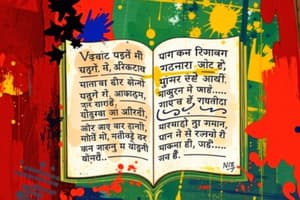Podcast
Questions and Answers
Match the following categories of Hindu texts with their descriptions:
Match the following categories of Hindu texts with their descriptions:
Shruti = Divine revelation believed to be eternal and unchangeable Smriti = Human compositions that may evolve over time Vedas = Examples of Shruti texts, including Rigveda and Samaveda Mahabharata = Examples of Smriti texts, encompassing the Bhagavad Gita
Match the following Hindu texts with their corresponding categories:
Match the following Hindu texts with their corresponding categories:
Upanishads = Shruti Ramayana = Smriti Puranas = Smriti Dharma Shastras = Smriti
Match the terms with their meanings:
Match the terms with their meanings:
Shruti = That which is heard Smriti = That which is remembered Eternal = Unchanging and universal authority Interpretative = Adaptive guidance on social and moral conduct
Match the examples of texts to their appropriate classification:
Match the examples of texts to their appropriate classification:
Match the aspects of Shruti and Smriti with their characteristics:
Match the aspects of Shruti and Smriti with their characteristics:
Flashcards are hidden until you start studying
Study Notes
Shruti
- Means "that which is heard"
- Divine revelation, believed to be directly revealed by the divine to ancient sages
- Considered eternal, unchangeable, and highest authority in spiritual matters
- Examples include the Vedas (Rigveda, Samaveda, Yajurveda, Atharvaveda) and the Upanishads
- Form the foundation of Vedic Hinduism
Smriti
- Means "that which is remembered"
- Human compositions based on Shruti teachings, written down and elaborated by sages
- Considered secondary to Shruti and can evolve or change
- Examples include the Mahabharata (including the Bhagavad Gita), the Ramayana, the Puranas (e.g., Vishnu Purana, Shiva Purana), and the Dharma Shastras (like the Manusmriti)
- Guide social and moral conduct, adaptable and contextual
Studying That Suits You
Use AI to generate personalized quizzes and flashcards to suit your learning preferences.




